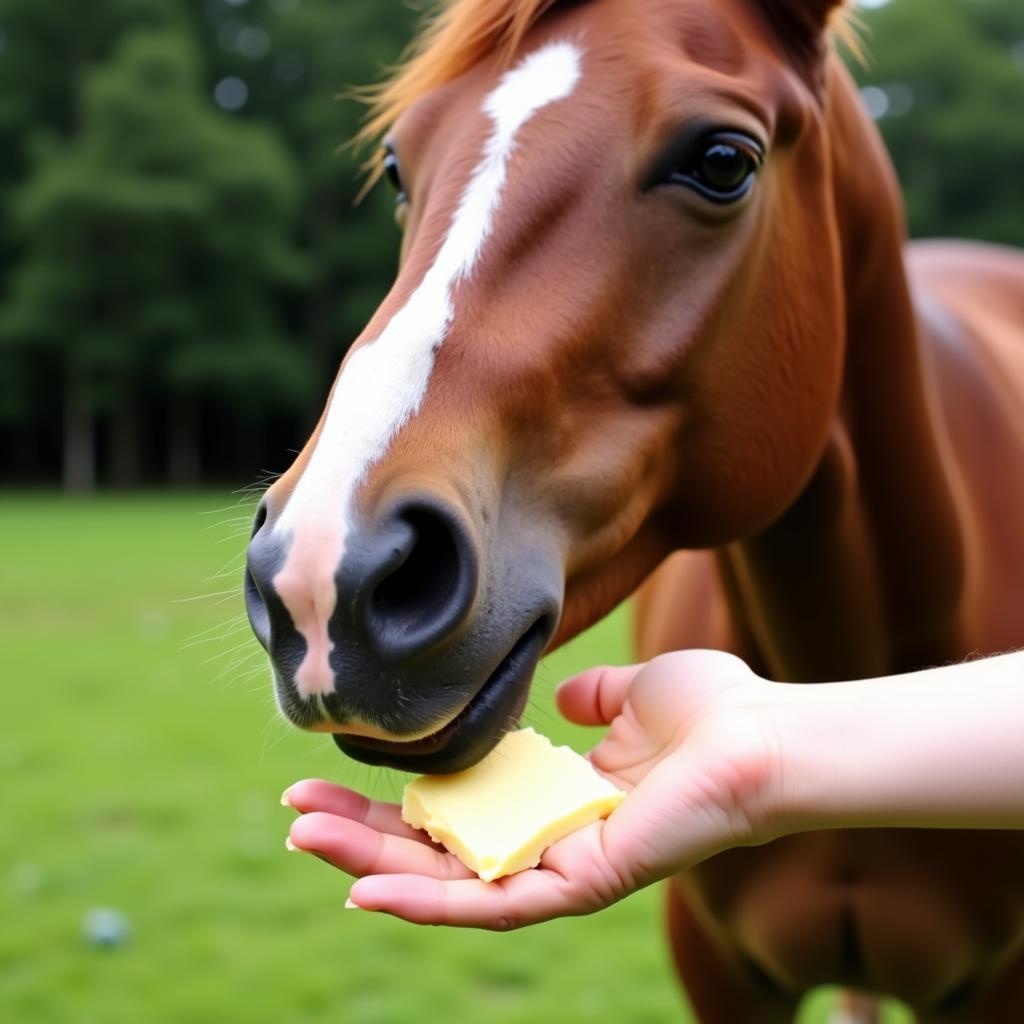Horse Butter. It’s a term that crops up occasionally in equestrian circles, often causing confusion. What exactly is horse butter, and what does it mean for your equine companion? This article delves into the world of “horse butter,” separating fact from fiction and providing you with accurate information about equine nutrition and care.  Horse Eating Butter from Hand
Horse Eating Butter from Hand
What People Mean by “Horse Butter”
The term “horse butter” doesn’t refer to a specific product like peanut butter for horses. Instead, it’s often used colloquially to describe several things. It can refer to supplements aimed at improving coat sheen, treats meant to entice a picky eater, or even, mistakenly, to actual butter given as a treat. Sometimes, “horse butter” might even refer to the creamy consistency of certain medications. If someone mentions butter horse, it’s crucial to clarify precisely what they’re talking about.
Is Actual Butter Good for Horses?
While a tiny sliver of butter likely won’t harm a horse, it’s not a recommended part of their diet. Horses have evolved to thrive on a forage-based diet, supplemented with grains and balanced minerals. High-fat foods like butter can disrupt their digestive system, potentially leading to colic or other health issues. There are much healthier ways to achieve a glossy coat or encourage a white buckskin horse to eat.
Achieving a Glossy Coat: The Real “Horse Butter”
Many equestrians desire a gleaming coat for their horses, sometimes referring to achieving this as creating a “horse butter” effect. A shiny coat indicates good health and proper nutrition. Instead of relying on fatty treats, focus on providing a balanced diet rich in essential fatty acids. Supplements like flaxseed oil or chia seeds can be beneficial, promoting a healthy coat from the inside out. Just like what human food can horses eat, understanding what’s beneficial versus what’s potentially harmful is key.
How Can I Improve My Horse’s Coat?
Regular grooming is just as important as diet. Currying and brushing help distribute natural oils, creating that sought-after shine. Remember to provide fresh, clean water and adequate shelter from harsh weather conditions.
Tempting Picky Eaters: Healthy Alternatives
Some horse owners might try using what they call “horse butter”—often sugary treats—to coax a picky eater. While a small treat occasionally won’t hurt, relying on them can lead to nutritional imbalances. Consult with your veterinarian to rule out any underlying health issues affecting appetite. Offering a variety of healthy forages, such as different types of hay, can sometimes entice a picky horse to eat. Remember, just like asking can horses eat sweet potatoes, it’s vital to research and choose safe treats.
The Importance of Proper Equine Nutrition
“Dr. Emily Carter, a leading equine nutritionist, emphasizes the importance of a balanced diet: ‘A healthy horse requires a diet tailored to its individual needs, considering factors like age, workload, and overall health. Avoid relying on quick fixes or fads. Consult a professional for personalized guidance.’ “
“Samantha Davis, an experienced horse trainer, adds, ‘A well-nourished horse is a happy horse. Focus on providing a balanced diet rich in forage, supplemented with quality grains and minerals as needed.'”
Conclusion
The term “horse butter” can be misleading. While it might conjure images of a delicious treat, it’s essential to prioritize your horse’s health by providing a balanced, species-appropriate diet. Focus on proper nutrition, regular grooming, and consulting with professionals to ensure your equine companion thrives. Don’t fall for fads; understanding your horse’s nutritional needs is the key to their well-being. Remember, if you’re considering adding anything new to your horse’s diet, even something that sounds as innocuous as “horse butter,” always consult with your veterinarian first.
FAQ
- What should I do if my horse won’t eat?
- What are the signs of colic in horses?
- How can I determine the correct amount of feed for my horse?
- What are some good sources of essential fatty acids for horses?
- What are the benefits of regular grooming for horses?
- Are there any human foods that are toxic to horses?
- What are some common misconceptions about horse nutrition?
Need help with choosing the right nutrition plan for your horse? Contact us! Phone: 0772127271, Email: [email protected] or visit us at QGM2+WX2, Vị Trung, Vị Thuỷ, Hậu Giang, Việt Nam. We have a 24/7 customer service team.